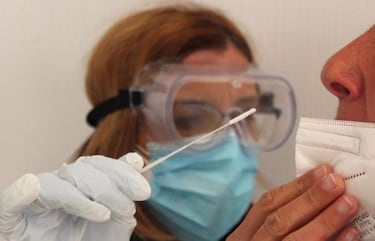Covid Omicron or allergy? How to tell the difference in symptoms
Parents especially are worried more than before when their children start coughing, sneezing or having breathing difficulties. So how can they differentiate?


Just ask any paediatrician with an increased waiting room of snotty children. The arrival of spring (even when it comes early like this year in many regions) causes an increase in cases of respiratory allergies, due to the changing environment that surrounds us, such as the pollination of various plants and trees in the early part of the year.
The symptoms in most allergy sufferers are closely related to those that have been seen in the last couple of months from those infected by the Omicron variant of the coronavirus, a much milder mutation than Delta that came before it, much more similar to those of influenza.
You may also be interested in:
- Covid-19: latest news
- Changes to SNAP benefits and where to redeem them
- Reduce your tax bill with the property tax deductible
- Viral fragment of unreported covid-19 variant found in New York City
How a coronavirus pandemic affects decision making
In previous years, people were quick to self-diagnose as an allergic reaction kicking in, something that was unpleasant for most, but debilitating for others. Following two years in a coronavirus pandemic, however, and your average man, woman or parent (yes, there is often a difference) has other concerns on their mind. In the early months of 2022 some will immediately jump to a lateral flow test to see if they, or their child, should be self-isolating.
For this reason, Álvaro Cano, medical manager at Aegon, acknowledging that people do not know how to differentiate between the conditions of an allergy and those of Omicron, has come out with some guidance.

How to distinguish between Omicron and allergy symptoms?
Nasal congestion and sneezing are the most common symptoms of a patient with an allergy, but this is very similar to many with Omicron. However, delving into the detail of that mucus you will find that it is "clearer and more fluid” in a covid case of this variant, according to Cano. He goes on to say that most people infected with Omicron do not have nasal irritation, unlike those with allergies, although they could share an itchy throat.
Another differentiating factor is that the Omicron infection often produces additional symptoms, marked by fever, headache and sore throat, a general malaise and even gastrointestinal issues. These are uncommon with an allergy.
Related stories
What is even more likely to reveal the reason behind any symptoms, even those that are identical, is the length of time of suffering. Whereas an Omicron infected patient could be feeling the effects for between two and five days, a respiratory allergy can last until the spring season is over.
To reduce the ill-effects of allergies, Cano advises those susceptible to keep their homes and offices clean and well aired, reducing the build-up of dust particles, and also to avoid parks and gardens that could be home to pollen spreaders.

